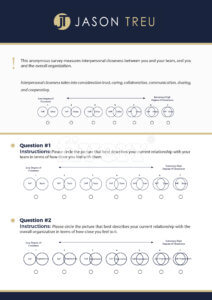by Jason Treu | Aug 14, 2018
What often looks like resistance by others is often a lack of clarity, understanding, and insight into a particular challenge or problem.
It’s a self-awareness problem that requires digging much deeper.
And the surface level or quick answer is usually the incorrect one.
For example, is the person not putting in enough effort because they don’t care or is it because they believe no one cares about them? Or both?
Are they not buying into being a team player because they are lazy/self-centered or is it because they don’t think anyone likes/cares about them? Or both?
by Jason Treu | Aug 13, 2018
What would happen if your biggest challenges were solved TODAY?
Ask yourself the miracle question.
Imagine a miracle occurs tonight to solves your biggest issue at work, what might this miracle be?
How is life going to be different now? Describe it in specific details.
What’s the 1st thing you are aware as you wake up in AM?
Sometimes we need to look at a challenge from a different angle/perspective.
Try it out!
PS: I ran across this concept in the book, Switch by Chip & Dan Heath.
by Jason Treu | Aug 10, 2018
Do you want to increase your bottom line, retain more employees, and increase your market penetration? Here’s why your company hemorrhaging cash by severely underperforming and how you can gain at least six-figures to your bottom line in six months if you can solve these three problems.
I’ve sat in all Forbes/Fortune Top Workplaces and they all can significantly improve. If that’s the case, imagine the upside for you.
Here’s the research to prove it to you:
- 65% of Americans would choose a better boss over a raise (i.e. more money isn’t the answer!).
- 75% of people quit because of a poor manager.
- 70% of employees are disengaged and don’t care.
- Replacement costs (and lost productivity) are 100%-300% of an employees salary.
How? Create a culture where people care. It’s that simple. You do that by getting people to share by asking vulnerable information and listening to what that person says. Then, you share back. That’s what the top 1% teams and organizations do. Psychology safety is the #1 determining factor for company performance. If you don’t have it, you aren’t high performing, period. Professor Arthur Aron found that in 45 minutes he could create the closest relationships in people’s lives with “complete” strangers.
Here is a free game (5,000+ people have played) I created that dramatically increases trust, engagement, productivity, and retention. This week, in only 90 minutes, three companies increased trust and employee closeness/caring by at least 20% (survey below). That’s a six-figure gain to the bottom line (at least). Plus, you create the environment where employees will grow, develop and stay significantly longer.
http://www.cardsagainstmundanity.com

by Jason Treu | Aug 6, 2018

We live in a culture that doesn’t want to deal with pain (hurt, failure, short comings, etc.) so it matastisides into blame and hate. It’s so much easier to cause pain than deal with pain.
It takes real courage and accountability to deal with your own pain.
by Jason Treu | Aug 4, 2018
“Continuous learning is the minimum requirement for success in any field.”
– Dennis Waitley
by Jason Treu | Aug 4, 2018
Narcissistic leaders in many instances are very good at setting a clear vision and get buy-in with their charisma. But they also tend to overrate their performance (poor self-awareness), dominate decision making, need significant recognition, much less caring, and are more likely to operate outside the norm (i.e. behave unethically).
Because of their low self-awareness, they believe they are great leaders, but they are rated at the bottom for leadership and management effectiveness by their teams.
Narcissistic leaders are typically very poor accepting feedback and therefore are unwilling to change.
While they may perform very well, it comes at a great cost and eventually it hinders the business in significant ways.
You can’t change a narcissist. They have to be willing to and that’s extremely rare. You’ll need to remove yourself from the toxic situation or you will find yourself changed in negative ways.
#narcissism #executive #executivecoach #humanresources #humannature #talentmanagement #executivedevelopment #career
by Jason Treu | Aug 3, 2018
Your job as a leader is to create the conditions for teams to thrive.
Three key steps to do this.
First, you need to remove the barriers and roadblocks that hold them back.
Second, you need to create the foundational layer to maximize communication, collaboration, problem-solving and productivity.
Third, you have to model and reward/recognize the behaviors you want them to exhibit.
by Jason Treu | Jul 10, 2018
Here is what to do when you hate your boss at work (and how to turn it around).
Step one, I’m putting you on a no complaining diet. Here is why.
You’ve probably heard or thought this before:
“I’m so frustrated and annoyed. My boss (or someone else in your organization) doesn’t get it. I’ve tried everything to perform well and make them happy, but nothing is working. I’m exhausted, upset, and they just suck. Maybe I’ll have to quit or transfer to another team.”
75% of people quit organizations because of their managers, not the organization itself. Poor management is a very real issue. Only 10% to 15% of managers are self-aware, but 95% believe that they are. There are tons of other statistics that go along with this.
But how is that going to help you deal with someone challenging or problematic?
It’s not.
You are the problem. That’s right. It’s YOU not THEM.
Acceptance is the first step in the process. For people who have severe behavioral issues, they can’t change until they accept the current situation and what’s going on. The same goes for you.
You aren’t going to change your manager, colleague, skip-level boss or CEO the organization. You will also always have to deal with difficult people in any place you work.
How you manage yourself is the key.
You have to change. You only can control two things: your behavior/actions/feelings and how you react.
You can quit, but in many instances, that’s not the answer. Changing how you engage is.
Here is what you do (this example will focus on your boss, but it could be anyone)?
(more…)
by Jason Treu | Jul 6, 2018
Fantastic day with the Ben E. Keith executive team in Fort Worth at the Petroleum Club. We focused on the next fiscal year and taking performance to the next level for the organization. I conducted a workshop on maximizing team performance, increasing engagement, collaboration, and satisfaction company-wide and how to more effectively manage others to increase their productivity.
by Jason Treu | Jun 23, 2018
Can empathy really hurt your career? Read this and let’s see what you think.
“Ken was a mid-level manager at a recruitment firm. Folks saw Ken as a “good guy.” He was well-liked by his employees and on good terms with upper-management. His team felt comfortable confiding in him; they often used his open-door policy to share their personal problems.
When Ken got word from upper-management that his team brought in the lowest numbers that quarter, he immediately knew the cause. Caitlin—previously the team’s top-earner—had been off her game for months. Her father’s poor health had caused her to miss work and diminished her productivity and focus in the office. Ansh’s work had also been suffering. Ken knew Ansh had been through a break-up recently and wasn’t taking it well.
In both instances, Ken hadn’t interfered. He knew the company’s bottom-line was being affected, but his empathy for Caitlin and Ansh kept him from giving them critical feedback, crucial for getting them back on track. Ken simply hoped their lackluster results would improve with time. They didn’t. And Ken’s reputation at the firm suffered.
We often talk about leaders who lack emotional intelligence, but a distortion in EI can also go too far in a leader. Empathy is a critical competency for understanding others’ points of view and finding common ground with people whose experiences differ greatly from our own. But great leaders also balance their empathy with strengths in other competencies.
Leaders who have a mindset that empathy does not allow needed feedback may have deficits in related EI competencies, such as conflict management. Ken’s empathy made him well-liked, but his misinterpretation of a leader’s role and what empathy means led him to avoid tough decision-making as well as not giving negative feedback.”
My Analysis:
Coleman makes a good point, and opens a much bigger question he didn’t deal with.
If you have a culture of truth-telling, you would avoid the problem Goleman points out.
Actually, I think it’s more conflict avoidance, which is RAMPANT in corporate america.
Empathy isn’t about engaging or not engaging. It’s about understanding another’s viewpoint, being aware of your emotional landscape, mutual vulnerability and it can be used as an interruption of power.
Here is a good podcast on Empathy by Knowledge@Wharton and new book, “I Feel You: The Surprising Power of Extreme Empathy.”
Great leaders don’t avoid discomfort and they consistently engage in difficult conversations. They use empathy as part of their process to understand what’s going on and to get more accurate information.
There are a very small amount of companies who have a culture like this. And I’ve never seen a large organization prioritize enough to make it a reality. This conflict avoidance makes a huge negative impact on the bottom line and key metrics.
What should you be asking? You need to be truth-telling and being direct so you can get more accurate information and dispel stories that hurt your relationships, performance, leadership, and collaboration. Every manager should be asking their employees on a monthly basis,”Rate your work product (customize for your work function & challenge you are focusing on) on a scale 1-10, one being poor and Reb being extraordinary. Why do you give yourself that number (and what data supports that)? What do you need to do differently to move it closer to a 10? What’s preventing you from doing that?”
Read the rest of the above article I quoted here: https://www.kornferry.com/institute/feedback-performance-management-emotional-intelligence



